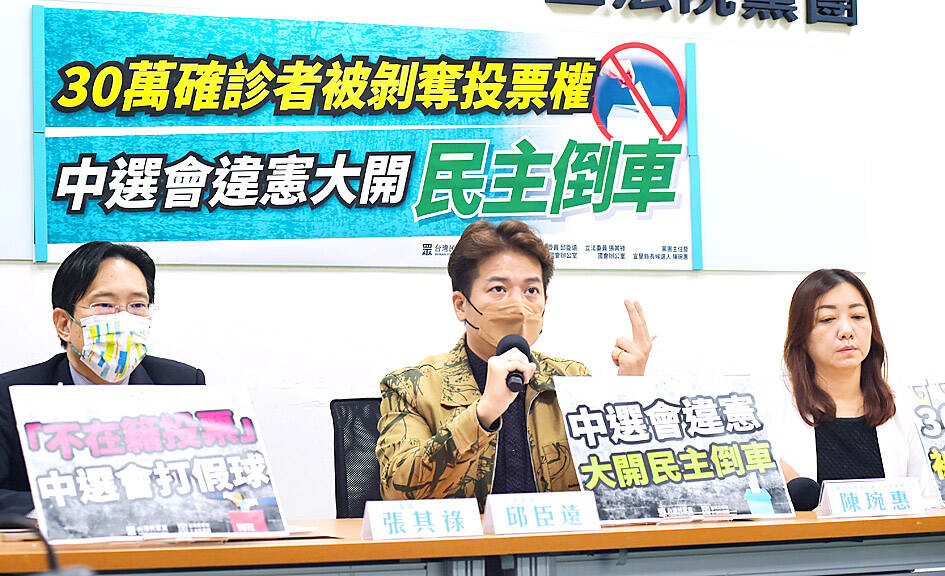The Taiwan People’s Party (TPP) caucus yesterday urged the Central Election Committee (CEC) to consult voting regulations in the US, Japan and South Korea to create a way for people infected with COVID-19 to vote in local elections on Nov. 26.
CEC Chairman Lee Chin-yung (李進勇) said last week that all eligible voters can cast ballots if they comply with measures implemented under the Communicable Disease Control Act (傳染病防治法).
Under the policy, people who test positive for COVID-19 and are under mandatory seven-day isolation during the elections would not be allowed in polling stations.

Photo: Fang Pin-chao, Taipei Times
TPP caucus convener Chiu Chen-yuan (邱臣遠) told a news conference yesterday that the US allowed COVID-19 cases to be inside polling stations in the 2020 presidential election if they wore masks and kept a social distance of at least 1.8m.
South Korea extended voting hours during its presidential election in March and allowed COVID-19 cases and people who were under quarantine to vote by driving or taking disease prevention taxis to voting stations during the final 1.5 hours of polling, Chiu said.
Japan passed a bill in June to allow COVID-19 cases and people who were under quarantine to vote by mail or allowed them to vote at exclusive polling stations during its House of Councilors election in July, he said.
The CEC and the Central Epidemic Command Center “should not pass the buck between each other” by saying that “there is no legal ground,” Chiu said.
A proposed amendment to the Referendum Act (公民投票法) to allow absentee voting was submitted to the legislature more than two years ago, but the CEC did not propose its own version, he added.
Chiu asked the CEC to draft a plan for absentee voting five months ahead of last year’s referendum, to which Lee replied that such a system would need to be electronic and would require nine months to create.
However, no effort was made to pass the amendment or establish the absentee voting system in time for the local elections, Chiu said.
TPP Legislator Jang Chyi-lu (張其祿) said that Democratic Progressive Party caucus whip Ker Chien-ming (柯建銘) blocked a Chinese Nationalist Party (KMT) caucus proposal to hold an extraordinary legislative session to deliberate the amendment in July last year, saying at the time that it should be delayed until the following legislative session.
The CEC said in October last year that absentee voting would not be allowed in the referendum held in December last year, as “regulations and complementary measures were not in place,” Jang added.
Absentee voting is a common practice allowed in democratic countries around the world, Jang said, citing examples of migrant workers from Indonesia and the Philippines being able to vote in their countries’ elections while in Taiwan, and nearly half of Estonia’s votes being cast online.
As a “technology island” and a democratic model in East Asia, Taiwan should prioritize implementing an absentee voting system, he said.

The first global hotel Keys Selection by the Michelin Guide includes four hotels in Taiwan, Michelin announced yesterday. All four received the “Michelin One Key,” indicating guests are to experience a “very special stay” at any of the locations as the establishments are “a true gem with personality. Service always goes the extra mile, and the hotel provides much more than others in its price range.” Of the four hotels, three are located in Taipei and one in Taichung. In Taipei, the One Key accolades were awarded to the Capella Taipei, Kimpton Da An Taipei and Mandarin Oriental Taipei. Capella Taipei was described by

EVA Airways today confirmed the death of a flight attendant on Saturday upon their return to Taiwan and said an internal investigation has been launched, as criticism mounted over a social media post accusing the airline of failing to offer sufficient employee protections. According to the post, the flight attendant complained of feeling sick on board a flight, but was unable to take sick leave or access medical care. The crew member allegedly did not receive assistance from the chief purser, who failed to heed their requests for medical attention or call an ambulance once the flight landed, the post said. As sick

The Taichung District Court yesterday confirmed its final ruling that the marriage between teenage heir Lai (賴) and a man surnamed Hsia (夏) was legally invalid, preventing Hsia from inheriting Lai’s NT$500 million (US$16.37 million) estate. The court confirmed that Hsia chose not to appeal the civil judgement after the court handed down its ruling in June, making the decision final. In the June ruling, the court said that Lai, 18, and Hsia, 26, showed “no mutual admiration before the marriage” and that their interactions were “distant and unfamiliar.” The judge concluded that the couple lacked the “true intention of

A drunk woman was sexually assaulted inside a crowded concourse of Taipei Railway Station on Thursday last week before a foreign tourist notified police, leading to calls for better education on bystander intervention and review of security infrastructure. The man, surnamed Chiu (邱), was taken into custody on charges of sexual assault, taking advantage of the woman’s condition and public indecency. Police discovered that Chiu was a fugitive with prior convictions for vehicle theft. He has been taken into custody and is to complete his unserved six-month sentence, police said. On Thursday last week, Chiu was seen wearing a white